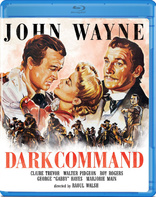Dark Command Blu-ray Movie
HomeDark Command Blu-ray Movie 
Olive Films | 1940 | 94 min | Not rated | May 28, 2013Movie rating
6.9 | / 10 |
Blu-ray rating
| Users | 0.0 | |
| Reviewer | 3.5 | |
| Overall | 3.5 |
Overview
Dark Command (1940)
When transplanted Texan Bob Seton arrives in Lawrence, Kansas he finds much to like about the place, especially Mary McCloud, daughter of the local banker. Politics is in the air however. ...
Starring: John Wayne, Claire Trevor, Walter Pidgeon, George 'Gabby' Hayes, Porter HallDirector: Raoul Walsh
| Western | 100% |
Specifications
Video
Video codec: MPEG-4 AVC
Video resolution: 1080p
Aspect ratio: 1.37:1
Original aspect ratio: 1.37:1
Audio
English: DTS-HD Master Audio Mono
Subtitles
None
Discs
25GB Blu-ray Disc
Single disc (1 BD)
Playback
Region A (locked)
Review
Rating summary
| Movie | 3.5 | |
| Video | 3.5 | |
| Audio | 3.5 | |
| Extras | 0.0 | |
| Overall | 3.5 |
Dark Command Blu-ray Movie Review
Civil War vs. Domestic Bliss.
Reviewed by Jeffrey Kauffman June 18, 2013John Wayne famously debuted in the widescreen (yes, widescreen) spectacular The Big Trail in 1930, seemingly instantly set for superstardom (or whatever that level of celebrity was called back in the day), only to see his hopes dashed when the film tanked and his performance was pilloried by the press (both the film and Wayne’s work in it hold up surprisingly well, as the recent Blu-ray of this really interesting piece more than proves). Wayne then found himself consigned to B-movies for the bulk of the rest of the decade, until a little John Ford film called Stagecoach came along in 1939, a film which moved Wayne to the front rank of A-list stars, even if he continued to toil away in less than prestigious Republic Pictures’ efforts for years to come. But here’s the interesting thing—from day one, whether in his vaunted debut, certainly a big budget film, or in the programmers which were churned out like so much sausage back in the day, Wayne almost always had top billing. He wasn’t always an above the title star, mind you, even in the big budget outings, but he was almost always first. Almost always. Except on two films where he co-starred with Claire Trevor, the aforementioned Stagecoach and what Republic Pictures probably would be seen as a felicitous follow up, 1940’s Dark Command. (I certainly don’t claim to be a Wayne expert, so there may indeed be other films where this is the case, but these are the only two I remember seeing with this anomaly.) Every home video release of Dark Command (including this one) lists Wayne front and center on the cover, but the actual credits shunt him off to the still respectable, but unusual, second place. This seems especially odd in that Dark Command came in the immediate wake of Stagecoach, when the luster on Wayne’s star was inarguably burning brighter than it ever had. But perhaps since Trevor had gotten the top spot on Stagecoach, it was assumed she should have the same billing here. There’s little doubt that Trevor’s character is the fulcrum around which most of Dark Command’s admittedly corny plot hinges, but there’s also little doubt that it’s Wayne’s presence that gives Dark Command much of its energy.
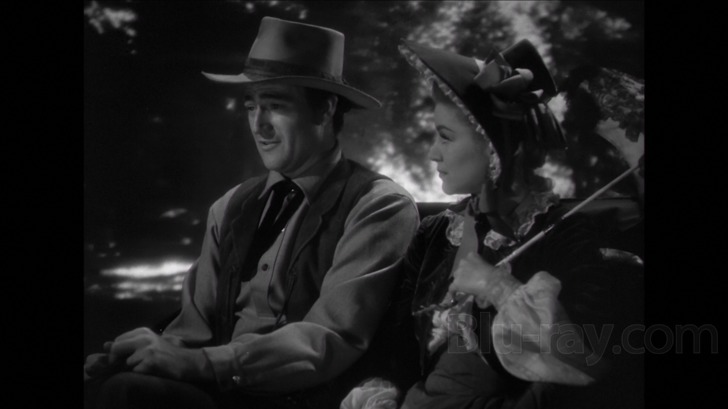
As hyper-partisan as American politics tends to be, sometimes that very (at least) bifurcated situation can be better than the vaunted “compromise” which is so often held up as a noble ideal. There’s probably no better example of that in our long and roiling history than the so-called Missouri Compromise, a probably well intentioned attempt to navigate the swirling waters between free states and slave states, but one which sought a perhaps odd “separate but equal” situation (pun intended, considering the 20th century’s famous Civil Rights battles) that sought to balance the number of free states with slave states. That meant that territories by themselves and especially those considering statehood had to individually confront what kind of place they would be, something only partially mitigated by the Compromise’s emphasis on geographic location. In 1854 the Kansas-Nebraska Act threw a new wrench into the works, creating the territories of Kansas and Nebraska, but in the process repealing the Missouri Compromise with regard to these new lands, saying a vote by the people should determine whether each would be a slave territory or not.
As might be expected, that decision led to—hyper-partisanship, with pro-slavery and anti-slavery elements fighting each other, something that only become more formalized when the actual Civil War broke out in 1861. If you’ve ever used the term “bushwhacker” without really knowing its etymology, it actually pertains to the guerrilla tactics employed by militias which sprang up in these largely agrarian communities during the onset of the Civil War. One of the most infamous bushwhacking outfits was led by a man named William Clarke Quantrill, a man who actually began his raids in Missouri but who led a devastating attack on Lawrence, Kansas, since he perceived that outpost to be the center of Union activity. And it’s with this background that we come to Dark Command’s highly fictionalized but still rather interesting treatment of some of these salient ideas.
Perhaps just a bit strangely, Dark Command is one of a couple of Wayne films coming out on Blu-ray to have a dental aspect (the other is In Old California, which I’ll be reviewing soon). In this film, we meet “field dentist” Doc Grunch (“Gabby” Hayes), who is treating a bunch of guys who’ve had their jaws socked by some rabble rouser out in a crowd. Three guesses who that might be. Of course, it’s Wayne as Bob Seton, who it turns out is in cahoots with Doc to drum up a little business and further their funding to get further West. When the two end up in Lawrence, Bob is almost immediately attracted to a little spitfire named Mary McCloud (Claire Trevor), though Mary is contemplating marrying the suave local schoolteacher Will Cantrell (Walter Pidgeon). Mary is also dealing with her rather naïve brother Fletcher (Roy Rogers— this is the only film that Rogers and Wayne appear in together) and pompous but lovable father Angus (Porter Hall).
While Bob seems to have the upper hand in the romantic triangle developing between him, Mary and Will, some rash behavior on the part of Fletcher upsets the matrimonial apple cart. When Mary does end up marrying Will, that would seem to put an unusual romantic barrier between her and Bob, though soon Mary discovers that Will is not the peace loving orator she thinks he is (the fact that Will’s last name in the film is rather similar to Qunatrill might serve as a clue as to his proclivities). This is a rather unusual role for Walter Pidgeon, an actor who tended to specialize in stolid, and in fact at times kind of bland, heroes. Pidgeon gets to strut his stuff in a somewhat more shaded way here, and he does surprisingly well. The supporting cast of Dark Command is also filled with some fantastic players, including future Ma Kettle Marjorie Main as Will’s well- meaning mother and the always reliable Raymond Walburn as a machinating local judge.
Dark Command is also notable for being the second and last pairing between John Wayne and legendary director Raoul Walsh. Walsh, who built a career out of exploiting rampant machismo, made what many at the time considered one of his few missteps when he cast an unknown as the star of his big budget, technically formidable 1930 film. The star? John Wayne, then known as Marion Morrison until Walsh himself allegedly renamed him. The film? The Big Trail. If this second helping isn’t quite the spectacular that the first outing was, it’s still an unusually exciting and interesting piece in both Wayne’s and Walsh’s filmographies.
Dark Command Blu-ray Movie, Video Quality 
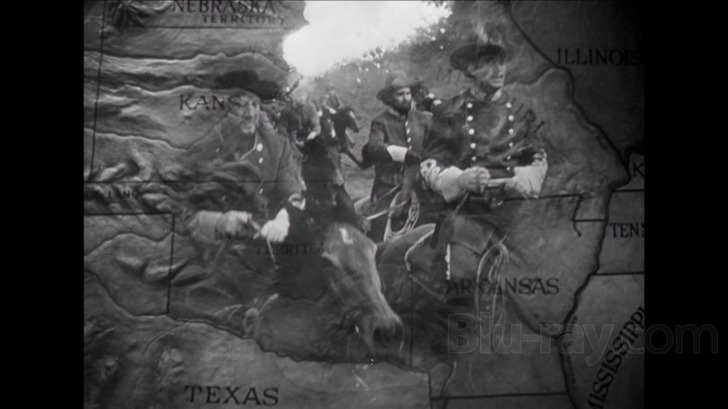
Dark Command is presented on Blu-ray courtesy of Olive Films with an AVC encoded 1080p transfer in 1.37:1. This is a generally solid looking transfer whose biggest drawback is the virtually nonstop "attack" of small white flecks and other minimal damage. Otherwise, the elements here are in at least decent shape, and often quite a bit more than that. Some of the opticals (and there are quite a few of them in this film, as evidenced by some of the screenshots accompanying this review) have the expected amount of extra softness and dirt on them, but overall Dark Command features a rather nicely detailed and reasonably crisp image. Contrast is generally very strong on this release, with good, deep blacks and well modulated gray scale.
Dark Command Blu-ray Movie, Audio Quality 
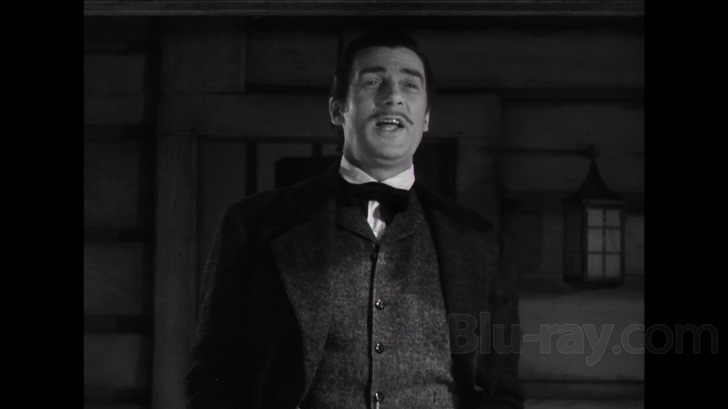
Dark Command's lossless DTS-HD Master Audio mono mix sounds surprisingly good, with a really full midrange and only some minor clipping in the high frequencies to belie its age. Dialogue is very cleanly presented, as is Victor Young's Academy Award nominated score. This has perhaps a bit more dynamic range than might be expected due to some of the big action set pieces (Lawrence goes down in flames at the end in a rather spectacular action sequence).
Dark Command Blu-ray Movie, Special Features and Extras 
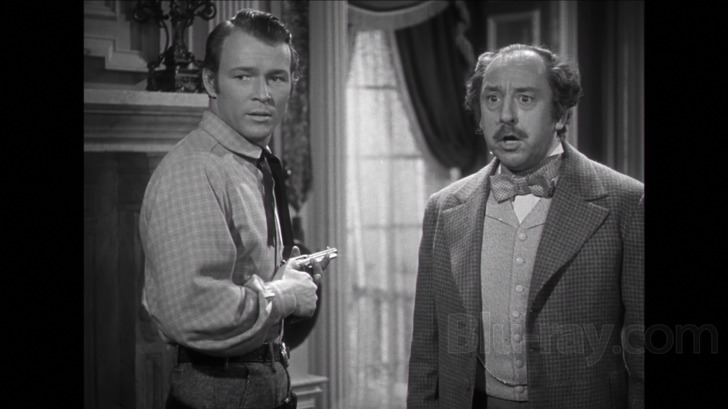
No supplements are offered on this Blu-ray disc.
Dark Command Blu-ray Movie, Overall Score and Recommendation 
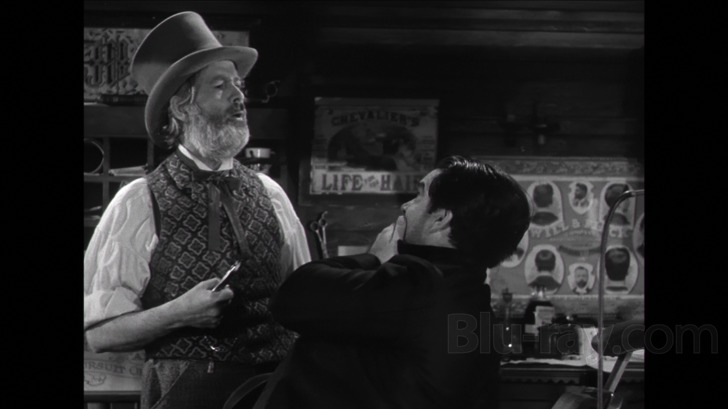
Dark Command bears a probably needless disclaimer that it's only loosely based on history. Since when did that keep Hollywood from trying? This may play fast and loose with bushwhacking and the general chaos sparked by various factions both immediately prior to and then during The Civil War, but it's still a rather good entry in the Wayne oeuvre, one with lots of action, a liberal dose of humor, and some fantastic supporting performances from a notable cast. It's especially interesting to see Walter Pidgeon in such an unusual role. This Blu-ray offers generally good video and audio and comes Recommended.
Similar titles
Similar titles you might also like

El Paso
1949

Badland
2019

Posse from Hell
1961

In a Valley of Violence
2016

The Law and Jake Wade
1958

Dodge City
1939

The Last Sunset
El Perdido
1961

Posse
1993

Chato's Land
2K Restoration
1972

Devil's Doorway
Warner Archive Collection
1950

Chisum
1970

The Hills Run Red
Un fiume di dollari
1966

A Bullet for the President
The Price of Power / The Price of Honor / Il prezzo del potere
1969

Hickok 4K
2017

The Sons of Katie Elder
1965

The Return of Frank James
Limited Edition to 3000
1940

Cimarron
Warner Archive Collection
1960

Old Henry
2021

The Outsider
2019

Law and Order
1953
